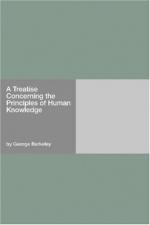145. Knowledge of spirits not immediate.—From what has been said, it is plain that we cannot know the existence of other spirits otherwise than by their operations, or the ideas by them excited in us. I perceive several motions, changes, and combinations of ideas, that inform me there are certain particular agents, like myself, which accompany them and concur in their production. Hence, the knowledge I have of other spirits is not immediate, as is the knowledge of my ideas; but depending on the intervention of ideas, by me referred to agents or spirits distinct from myself, as effects or concomitant signs.
146. But, though there be some things which convince us human agents are concerned in producing them; yet it is evident to every one that those things which are called the Works of Nature, that is, the far greater part of the ideas or sensations perceived by us, are not produced by, or dependent on, the wills of men. There is therefore some other Spirit that causes them; since it is repugnant that they should subsist by themselves. See sect. 29. But, if we attentively consider the constant regularity, order, and concatenation of natural things, the surprising magnificence, beauty, and perfection of the larger, and the exquisite contrivance of the smaller parts of creation, together with the exact harmony and correspondence of the whole, but above all the never-enough-admired laws of pain and pleasure, and the instincts or natural inclinations, appetites, and passions of animals; I say if we consider all these things, and at the same time attend to the meaning and import of the attributes One, Eternal, Infinitely Wise, Good, and Perfect, we shall clearly perceive that they belong to the aforesaid Spirit, “who works all in all,” and “by whom all things consist.”
147. The existence of god more evident than that of man.—Hence, it is evident that God is known as certainly and immediately as any other mind or spirit whatsoever distinct from ourselves. We may even assert that the existence of God is far more evidently perceived than the existence of men; because the effects of nature are infinitely more numerous and considerable than those ascribed to human agents. There is not any one mark that denotes a man, or effect produced by him, which does not more strongly evince the being of that Spirit who is the Author of Nature. For, it is evident that in affecting other persons the will of man has no other object than barely the motion of the limbs of his body; but that such a motion should be attended by, or excite any idea in the mind of another, depends wholly on the will of the Creator. He alone it is who, “upholding all things by the word of His power,” maintains that intercourse between spirits whereby they are able to perceive the existence of each other. And yet this pure and clear light which enlightens every one is itself invisible.




